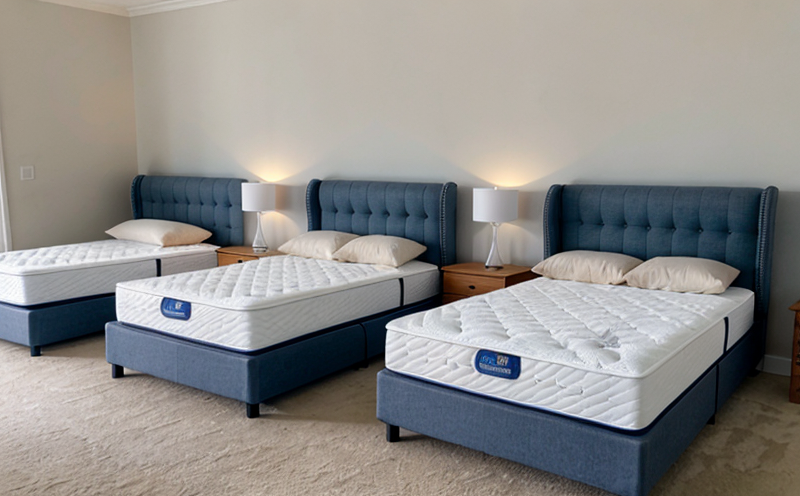BS EN 597-2 Assessment of Ignitability of Mattresses Match Flame Equivalent Testing
The BS EN 597-2 standard is a European Union directive designed to ensure the safety and quality of mattresses. This standard specifically addresses the ignitability properties of mattresses, focusing on their behavior when exposed to ignition sources such as matches or cigarettes. The primary goal is to prevent fires caused by accidental ignition from these sources.
The test procedure outlined in BS EN 597-2 involves placing a match flame onto a small area of the mattress and monitoring its response under controlled laboratory conditions. The results provide critical data on how quickly the mattress ignites, how it burns, and whether it extinguishes spontaneously or requires external intervention to stop the fire.
This testing is crucial for manufacturers to ensure compliance with safety regulations and to protect consumers from potential hazards associated with flammable materials in mattresses. It helps identify areas where improvements can be made to enhance the fire resistance of mattress products.
The testing process starts with careful preparation of the mattress samples, ensuring they are representative of the product being tested. The sample dimensions must adhere strictly to specified standards to ensure accurate and comparable results across different manufacturers.
Once prepared, the mattresses undergo rigorous testing under controlled conditions in a specialized laboratory environment. During the test, a standardized match flame is applied to a specific area of the mattress surface for 10 seconds. Observers meticulously record the behavior of the material after exposure, noting factors such as ignition time, flaming duration, and the extent of damage.
After testing, detailed reports are generated, summarizing all observations and providing recommendations for any necessary modifications to improve fire safety performance. Compliance with this standard not only ensures legal requirements but also enhances brand reputation by demonstrating a commitment to consumer safety.
The importance of this test cannot be overstated in today’s world where public awareness about home fire risks is higher than ever before. By adhering to BS EN 597-2, manufacturers can contribute significantly to reducing the risk of accidental fires caused by matches or cigarettes.
Understanding the intricacies of this testing process requires familiarity with relevant standards like ISO and ASTM. These international guidelines provide additional context and support for conducting accurate tests. For instance, ISO 16950-3 offers complementary insights into flame spread behavior in textiles, which is essential when evaluating materials used in mattresses.
Implementing BS EN 597-2 testing early in the product development cycle allows manufacturers to identify potential issues and make informed decisions about material selection. This proactive approach can lead to significant cost savings by avoiding costly recalls later in the production process.
Quality and Reliability Assurance
- Consistent Testing: Ensuring that all mattresses meet strict ignitability standards through consistent testing procedures.
- Data Accuracy: Maintaining precise records of test results to ensure accurate reporting and comparison across batches or products.
- Material Evaluation: Identifying the most suitable materials for mattress construction based on their performance during ignition tests.
- Continuous Improvement: Regularly updating testing methods and procedures to align with evolving safety regulations and best practices.
The rigorous quality control measures implemented ensure that every mattress produced meets stringent safety standards. This commitment to excellence translates into products that are not only compliant but also exceed expectations in terms of fire safety performance.
By adhering strictly to BS EN 597-2, manufacturers can significantly enhance the reliability and durability of their mattresses. The use of advanced instrumentation and meticulous recording of test parameters ensures accurate assessment of material ignitability properties. This approach fosters trust among consumers who are increasingly concerned about fire safety in domestic settings.
Regular audits and reviews of testing protocols help maintain high standards of quality assurance. Continuous improvement efforts focus on refining methodologies to stay ahead of emerging trends in flame retardant technology and consumer expectations regarding product safety.
Customer Impact and Satisfaction
The implementation of BS EN 597-2 testing has a direct impact on customer satisfaction by addressing one of the most critical concerns for consumers: home fire risks. By ensuring that mattresses meet stringent ignitability standards, manufacturers can provide peace of mind to their customers.
Customers appreciate the added layer of safety provided by compliant products, which reduces the likelihood of accidental fires caused by matches or cigarettes. This enhances brand loyalty and reputation as consumers trust brands that prioritize product safety.
The availability of detailed test reports also empowers informed purchasing decisions. Consumers can review these reports to make educated choices about the mattresses they purchase, knowing that rigorous quality control measures have been applied during production.
Furthermore, compliance with this standard sets a benchmark for industry standards, encouraging competitors to follow suit and adopt similar practices. This collaborative approach fosters innovation within the sector as manufacturers strive to meet ever-higher safety benchmarks.
Competitive Advantage and Market Impact
The adoption of BS EN 597-2 testing offers significant competitive advantages for manufacturers who choose to comply with these stringent standards. It positions them at the forefront of fire safety innovations, providing a clear differentiation point in an increasingly crowded market.
By meeting or exceeding these standards, manufacturers can command higher prices for their products due to enhanced perceived value among consumers. This premium pricing strategy allows companies to capture more substantial margins while maintaining strong brand equity.
The ability to demonstrate compliance with internationally recognized standards like BS EN 597-2 also opens up new market opportunities in regions where these regulations are enforced or being considered for implementation. Exporting to EU countries and other jurisdictions that adopt similar safety protocols becomes more feasible, thereby expanding global reach and potential revenue streams.
Moreover, early adoption of such stringent testing procedures can preemptively address future regulatory changes, avoiding costly non-compliance penalties and ensuring long-term sustainability within the industry. This forward-thinking approach underscores a commitment to excellence that resonates positively with stakeholders across the supply chain—from suppliers to end-users.





